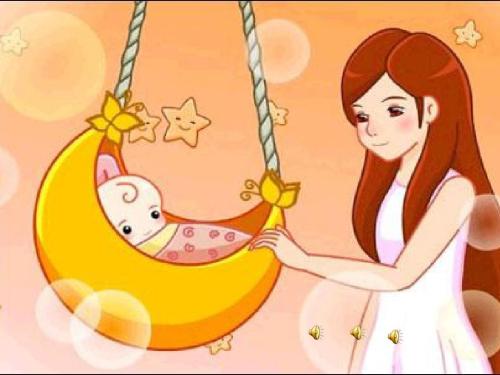By Ruiming Zhang
I have always stored the memory of my mother singing a lullaby to me in the deepest part of my mind, and I have never shared this distant childhood memory with others. However, when I received this interview project, I started to think: Yeah, what do other people think of lullabies? What will their story be? What are the similarities with me? Then, I started my interview at a quiet midnight. And I realized: In addition to being a tool to coax children, a lullaby is also a cultural heritage and expression of love.
My interviewee is my good friend Oliver. We are both from China with similar cultural backgrounds. We have known each other for two years, and this is the first time we have discussed our childhood in depth. Ten minutes before the interview, I sent my list of questions to Oliver. I want him to look at the content of the question, but I don’t want our conversation to be framed by a fixed answer. I don’t want our interview to be overly formal. I hope Oliver can express his true thoughts as freely as just talking to friends.
In the beginning, Oliver told his childhood story. He often cried when he was a child, so his grandparents would sing lullabies for him to make him fall asleep. Because his parents were always busy with work, his grandparents sang to him most of the time. Every time he heard a lullaby, he would soon fall asleep without crying. I recalled that when I was little, I didn’t live with my grandparents, so my mother was responsible for singing the lullaby. I didn’t like crying, but more like throwing a tantrum, hoping my mother coaxed me to sleep. Because when I was little, my babysitter accompanied me to sleep most of the time, and she rarely sang lullabies to me. I watch TV alone every night and go to sleep when I feel tired. So I cherish every time I sleep with my mother. Every time my mother sang a lullaby, she would gently pat me on the back. This feeling is very reassuring and comfortable. I felt that I was loved by my mother.
Oliver’s favorite lullaby is called “Two Tigers”, this is the most famous lullaby in China, and almost everyone can sing it. The reason is that his Chinese zodiac is a tiger, and his elders call him “little tiger”. So every time he listened to this lullaby, he was very happy and felt that this song was singing himself. He also sang “Two Tigers” to us.
In addition, he has many detailed observations. For example, he said, “Many lullabies have animal elements, these are derived from the zodiac signs.” I have never noticed this before, but after he gave a few examples, I found this is true. When Oliver and I were little, we both heard lullabies like “Little Mouse,” and “Little Rabbit.” I was also reminded of many lullaby songs with “grandma” or “mother” as the title and protagonist. This may be because of China’s deep-rooted family concept. As a lullaby, it may not only be a song to coax children to sleep, but also convey Chinese culture and elements to us. In fact, the “two tigers”, which are very famous in China, came from France. They are completely different after the lyrics are adapted. I think that each version is an adaptation of the lyrics based on the culture of each country. I realized that a lullaby may have a deeper meaning, to teach children to learn something.
At the same time, he thinks singing a lullaby is a responsibility. I have never thought about it this way before, but I agree with him. Chinese culture is very particular about the concept of family and elders, so elders singing lullabies to children are partly motivated by a sense of responsibility. When he said “I feel like I kind of grew up and I have to take more responsibility for my home for my family. That’s because I’m the bigger cousin. ” He smiled shyly. He was a little unbelievable that he had become a responsible big brother from a child who was listening to lullabies before. Oliver sang lullabies for his little cousin, and in the future, he will also sing a lullaby for his children. He believes that if you don’t sing lullabies to your children in the future when other children in the kindergarten ask him/her “What lullaby does your parents sing for you?”, he/she will feel sad and special.He looked at me firmly, with a serious tone. I can feel that he is a person who values family very much. I remember that my mother always sang lullabies to me, but she was actually very tired after work every day. She always sang and fell asleep while I was still awake. But she still insisted on singing the lullaby to me because of her love and sense of responsibility for me. The peace of mind when I sang a lullaby. I feel that singing a lullaby is more like a task for my babysitter, but a responsibility for my mother, containing love for me.
Oliver now prefers to listen to pop music. He believes that the biggest difference between pop music and lullaby is not the difference in melody, but the difference in emotion. Because there are so many types of popular music, it is difficult to distinguish them by melody. But popular music mostly tells some lyrics about love, lyrics with negative energy, or lyrics with passion. He will choose to listen to him while exercising, giving him more energy. The emotion that the lullaby brings to him is to make him feel at ease and calm his emotions. When he heard the lullaby, he would think of the way his grandparents sang a lullaby to sleep him when he was a child, and he missed home. Due to the COVID-19 and schoolwork, Oliver has not returned to China to see his family for three years. Speaking of this, he was a little sad. This is also the charm of music — not only the melody, but also include the emotions and memories.
Next, I showed Oliver an English lullaby. He believes that whether it is a Chinese lullaby or an English lullaby, their melody is very soft and slow. The lyrics are so simple that even children can understand. Lyrics and pictures also contain animal elements. These are very interesting elements for children.
After the interview, I found that I had a better understanding of lullabies. I think a lullaby is a bridge between people. Oliver made me discover many details that express the love from my family that I hadn’t noticed before. The Chinese way of expressing love is always too euphemistic, but every time my mother endures sleepiness and sings a lullaby to me is actually the greatest love. Although Oliver rarely saw his parents in his childhood, his memory also became warmer because of the company of his grandparents. Through the lullaby, we have more fond memories of childhood. And the fond memories brought to us by these elders will also be passed on to our next generation. The lullabies help the children fall asleep and bring memories to the children. In addition to being a tool to coax children, a lullaby is also a cultural heritage and expression of love.


